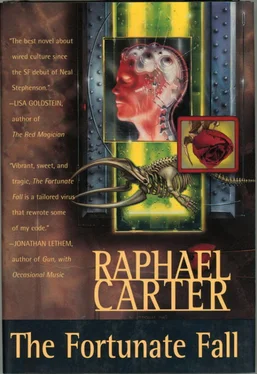Raphael Carter - The Fortunate Fall
Здесь есть возможность читать онлайн «Raphael Carter - The Fortunate Fall» весь текст электронной книги совершенно бесплатно (целиком полную версию без сокращений). В некоторых случаях можно слушать аудио, скачать через торрент в формате fb2 и присутствует краткое содержание. Город: New York, Год выпуска: 1996, ISBN: 1996, Издательство: Tor Books, Жанр: Киберпанк, на английском языке. Описание произведения, (предисловие) а так же отзывы посетителей доступны на портале библиотеки ЛибКат.
- Название:The Fortunate Fall
- Автор:
- Издательство:Tor Books
- Жанр:
- Год:1996
- Город:New York
- ISBN:0-312-86034-X
- Рейтинг книги:3 / 5. Голосов: 1
-
Избранное:Добавить в избранное
- Отзывы:
-
Ваша оценка:
- 60
- 1
- 2
- 3
- 4
- 5
The Fortunate Fall: краткое содержание, описание и аннотация
Предлагаем к чтению аннотацию, описание, краткое содержание или предисловие (зависит от того, что написал сам автор книги «The Fortunate Fall»). Если вы не нашли необходимую информацию о книге — напишите в комментариях, мы постараемся отыскать её.
“Gripping…. One of the most promising SF debuts in recent years”.
—“Publisher’s Weekly” starred review
The Fortunate Fall — читать онлайн бесплатно полную книгу (весь текст) целиком
Ниже представлен текст книги, разбитый по страницам. Система сохранения места последней прочитанной страницы, позволяет с удобством читать онлайн бесплатно книгу «The Fortunate Fall», без необходимости каждый раз заново искать на чём Вы остановились. Поставьте закладку, и сможете в любой момент перейти на страницу, на которой закончили чтение.
Интервал:
Закладка:
“The Army worked its way across the pit to where I lay. One of the soldiers—a girl of sixteen, wearing a peacoat over a thin summer dress—lifted up the man that had been lying across my arms. As she held him upright, another soldier, elderly, clad in rags, turned out his pockets. And something hard—a coin, a pocket knife—fell from his pocket and struck my temple.
“In the movies, I’d have held stoically still, to fool the Army. Well, you try it sometime. Of course I jumped; I would have jumped more, if so much of me hadn’t been paralyzed; and I very nearly cried out, too. The Army took no notice. As you have found, Andreyeva, against an unimaginative enemy any fool can be a hero.”
I kept my mind blank, relying on Keishi to screen out any furtive thoughts of the Postcops. I should have known he’d know.
“When the man had been thoroughly searched, the girl took a soda bottle from her pocket, upended it into her palm, and daubed his face with a red, stinking mixture: the done-paint. By the time they were finished, the whole camp would be covered with this goo, whose stench would tell everyone for miles around that the Army need not come again. As the two soldiers walked away, I turned my head a little to watch them go. They climbed out of the pit on the backs of other soldiers, who had formed a human ladder up the side. Many of those leaving the pit were carrying bodies—I presumed for food.
“The next soldier that came by lifted me up from behind, just as the other man had been lifted. I went limp, hoping they wouldn’t know I was alive. The man who came to strip me was a middle-aged Japanese fellow in the remains of an expensive business suit. He turned out my pockets, which of course held nothing, then reached his hand into my shirt—and paused. He laid his hand against my forehead, then pressed his cheek to mine. The warmth of my body had given me away. He reached his hand toward my neck, and for a second I was sure he was going to strangle me; but no, he only wanted to feel my pulse. When that was done, he examined my socket, turning his head to see it from several angles, with a motion that reminded me of robot welders. He turned and made several quick hand signals, then walked away toward the back-bridge, leaving me suspended.
“The next soldier passed without looking, and the next after that, until I began to hope they had forgotten me. But then one stopped in front of me and stood there motionless, waiting. In the distance, a black ring was thrown down into the pit and passed from hand to hand. At last it came to the soldier before me. It was a coiled cable. He was going to infect me with the Army.
“As he unwound the cable, I flexed my fingers. That part of my carapace still worked, yes, but there might yet be subtle damage, and besides, the battery was almost dead. I couldn’t hope to overpower him. He inserted one end of the cable into his temporal socket, and then, as if relishing my terror, gradually extended the other end toward me. Just when he was about to slide the plug home, I blocked it with one hand, and with the other put the plug into my wrist socket. I reached my hand into his brain and tore it away from the Army mind.
“For a moment he was Michael Arnason, aged thirty-four, from Sussex, England, a solicitor’s clerk, who had gone to sleep one night beside his wife and woken in this pit of death alone—but that was only for a moment. Then he shuddered, and the glimmer of selfhood went out of his eyes. Moving jerkily, he reached into his trenchcoat, took out a bottle of done-paint, and poured it over my head. When the soldier behind me smelled it he let me drop, but the thing that had been Arnason grasped me under the arms, threw me over his shoulder, and carried me up the ladder of backs. As soon as we were out of the pit, I turned him toward the setting sun, and we began the long walk westward to our meeting with the whale.”
Seventeen
FALLEN LIKE LIGHTNING
“You said—” I conferred with the Net briefly “‘—None of it mattered. I was free.’ Yet you came back here.”
“What else could we do? There aren’t many places you can keep a crippled whale.”
“Why couldn’t she stay in the ocean?”
“Derzhavin’s modifications made her dependent on electronics for her life; from that, nothing could free her. Without maintenance, she wouldn’t have lived out the year. One of her socket seals would have been torn away, perhaps; it would take no more than that. And then, too, Derzhavin had converted portions of her brain to uses they were not intended for—a cloverleaf with an unenhanced whale would have been of little use. Some of the things he took from her would have been crucial to survival in the wild. So we waited, I repairing my exoskeleton, and she finding what food she could. And next summer, when the ice was gone and the ocean warm, my selves began our separate journeys to Arkhangelsk, home.”
Time? I asked Keishi.
“All the time in the world, girl. You think they’re going to cut this off? But Maya, News One wants another look at the whale.”
Then let them turn off the feedback.
“I can turn it down to one-quarter for you.”
Not enough, I said. Tell them to go to hell.
“I don’t think that’s such a good idea,” she said. “When you started pulling record ratings, Netcast became remarkably unhelpful to the Post police. If you lose viewers…”
I get the picture, I said. One-quarter it is.
When I felt my limbic system settle down, I said, “Let me apologize to all of you for that delay. News One has told me that you would all like another look at the whale. I’m going to do it, but please, remain as calm as possible. Otherwise you’ll have to wait till we can get a robot camera in here to film it. Come on, people, it’s just a dolphin with gland problems—nothing to get excited about.”
“Instead of just looking at her,” Voskresenye said with quiet amusement, “would you like to talk to her?”
“I thought I was.”
“Not exactly—any more than you’re talking to Stepan Sornyak. I am a fusion of the two, a compromise—’O my negotiated soul’ is in the Sapir, too. Thanks to his injuries, my man-self cannot be separated from that union, but the whale can. I have only to release the portions of her mind I occupy—to see myself in the half-silvered mirror.”
“How long will that take?”
“An instant. I will appear to have fainted; do not be alarmed. Once the artificial neuromodulators have been stilled, it will take some few seconds for her neurons to reorganize into their natural circuits—such, that is, as Derzhavin did not destroy completely.” Then another thought seemed to strike him: “If you like, you can turn over the Netcast to her for a while. She can output telepresence. I’m sure your audience would be interested to find out what it’s like to be a whale.”
The audience was far too interested, and Voskresenye was far too casual. I didn’t believe for a second that he’d just thought of the idea.
But you don’t spend thirty years as a camera and turn up your nose at something like that. It’s just not in the programming.
“All right,” I said warily. “How do I wake you when we’re done?”
“A good hard shaking will generally do it,” he said as he closed his eyes.
I turned around, panning my eyes along the floor so as to sneak up on the sight. My mind was trying to go in all directions at once, like a chariot drawn by eight cats. But at least I could control it. I raised my eyes to the whale.
Instinctively, my mind sought analogies. It’s something I do as a camera—it gives people something to quote over breakfast. This time nothing would come. She was simply herself, beyond all comparison, the metaphor for big.
Читать дальшеИнтервал:
Закладка:
Похожие книги на «The Fortunate Fall»
Представляем Вашему вниманию похожие книги на «The Fortunate Fall» списком для выбора. Мы отобрали схожую по названию и смыслу литературу в надежде предоставить читателям больше вариантов отыскать новые, интересные, ещё непрочитанные произведения.
Обсуждение, отзывы о книге «The Fortunate Fall» и просто собственные мнения читателей. Оставьте ваши комментарии, напишите, что Вы думаете о произведении, его смысле или главных героях. Укажите что конкретно понравилось, а что нет, и почему Вы так считаете.












